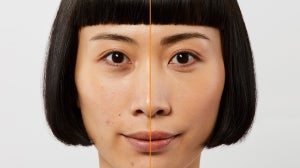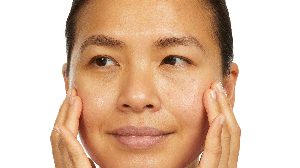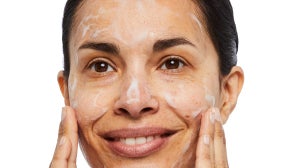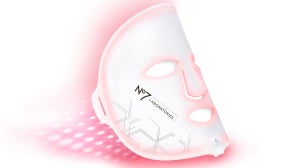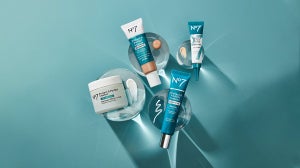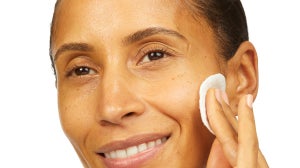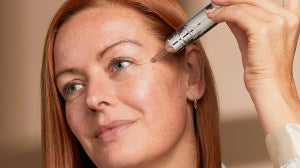
Concerned you may have rosacea? Take a deeper dive to understand this common, yet often misunderstood, skin condition
Are you noticing you have breakouts of facial redness? Perhaps you suspect you have rosacea symptoms but aren’t quite sure what it is or how best to manage it? In this article, we’ll delve into the common skin condition; exploring its symptoms, causes, emotional impact and most importantly, self-care strategies to help you look after your skin.
What is rosacea?
Rosacea is a common skin condition that affects an estimated 415 million people worldwide. It mostly affects the facial area, particularly the cheeks, forehead, chin, and nose, causing persistent redness caused by dilated blood vessels, small bumps and sometimes acne-like pustules.
Rosacea can affect people of any age, skin colour or gender, but seems to predominantly affect fair-skinned people and most commonly appears in young adults. Women tend to be more readily affected by the condition, however, in men, it can appear more severely. It is a long-term condition that can fluctuate in its severity and is classified into four subtypes that may overlap. It is important you speak to your GP if you think you may have rosacea.
What causes rosacea?
Frustratingly for those who have rosacea, the exact cause is not fully understood. Genetics, immune system issues and environmental factors may all play a part.
There are many triggers that may make rosacea symptoms worse. These include, exposure to sunlight, alcohol, exercise, high and low temperatures, hot drinks, spicy foods and everyday stress. Rosacea is not contagious and can’t be passed from person to person.
What are the symptoms of rosacea?
The hallmark symptom of rosacea is persistent facial redness, often resembling a flushed or sunburned appearance. At first, you may notice you have developed a tendency to blush easily and this redness may come and go, however, it tends to become more pronounced over time, developing into a more permanent deeper shade of red.
You may notice small dilated blood vessels, bumps and acne-like pus-filled spots starting to appear. Rosacea tends to affect the cheeks, nose, forehead, chin and neck. You may start to notice some facial swelling, especially around the eyes and nose.
In severe cases, some people may develop eye problems with blurred vision and pain — it’s important you seek immediate medical advice from your GP if this is something you're experiencing.
Rosacea can affect all skin tones and it’s worth bearing in mind that rosacea on brown or black skin tones can appear differently to rosacea on fair skin tones.
Flushing &blushing: People with rosacea may experience episodes of sudden facial flushing or blushing triggered by things like spicy foods, alcohol, temperature changes, everyday stress or emotional reactions.
Visible blood vessels: Rosacea causes the small blood vessels on the face to enlarge which can make them visible and create a spider-like appearance on the skin.
Acne-like bumps: Some people with rosacea experience red bumps that resemble acne and are sometimes filled with pus. These bumps can be painful and are often mistaken for regular pimples, it is advisable to speak to your GP if this is something you are noticing.
Eye problems: Rosacea keratitis can affect the eyes, causing painful inflammation to the front part of the eye. In severe cases, it may lead to vision problems if left untreated, so it is important to speak to your GP immediately if these symptoms are affecting you.
Is there an emotional impact of rosacea?
Having rosacea can be hard and its emotional toll should not be underestimated. Many people with rosacea experience a range of emotions, including embarrassment, self-consciousness, anxiety and frustration.
The visible symptoms of rosacea can negatively impact self-esteem and quality of life, and may make you feel like withdrawing from social and public situations. In addition, the lack of information available about the condition can be very disheartening leading to delayed treatment and unnecessary emotional distress.
It's essential to address both the physical and emotional aspects of rosacea for a holistic approach to managing the condition. Speak to your GP to help with this. There are also a number of charities and support groups that you might want to join.
Can lifestyle and self-care changes help rosacea?
There are several lifestyle and self-care strategies you can implement to help alleviate the symptoms of rosacea:
Skincare routine:
Rosacea can make your skin more sensitive to the sun, so it is important to make sure you're using a high protection sunscreen of at least SPF30, which also has high UVA protection (4 or 5 UVA stars), and make sure you apply it generously and frequently when in the sun.
Use gentle, fragrance-free skincare products designed for sensitive skin. Avoid harsh cleansers and abrasive scrubs that can irritate the skin and do not rub or scrub your skin when cleansing.
Perfumed soaps can exacerbate the situation, so make sure you use an emollient soap substitute to cleanse your face.
Cosmetics such as rosacea-approved skin camouflage make-up designed to lessen the appearance of redness can be useful for some people.
Identifying & avoiding triggers:
While things that cause a flare-up of rosacea can vary from one person to another, it can be helpful to keep a diary to track potential triggers such as spicy foods, alcohol, sun exposure and environmental factors. Once you have identified things that make your rosacea worse, you can try to avoid or minimise exposure to these. It may also be helpful to limit the consumption of spicy foods, hot beverages and alcohol.
Temperature &weather:
Protecting your face from extreme cold, heat and wind by wearing a face covering such a scarf or using a barrier cream may help.
Everyday stress management:
Practice techniques to help reduce everyday stress, such as yoga, meditation or deep breathing exercises.
Is it necessary to seek medical advice?
If you suspect you have rosacea, seeking guidance from your GP is essential. They can diagnose you and may refer you to a skin specialist (dermatologist) who can provide you with a personalised treatment plan tailored to your unique condition and symptoms. Medical treatments for rosacea could include topical or oral medication that may help to reduce redness and inflammation. If rosacea symptoms are affecting your eyes, seek urgent medical advice from your GP or call NHS 111.



